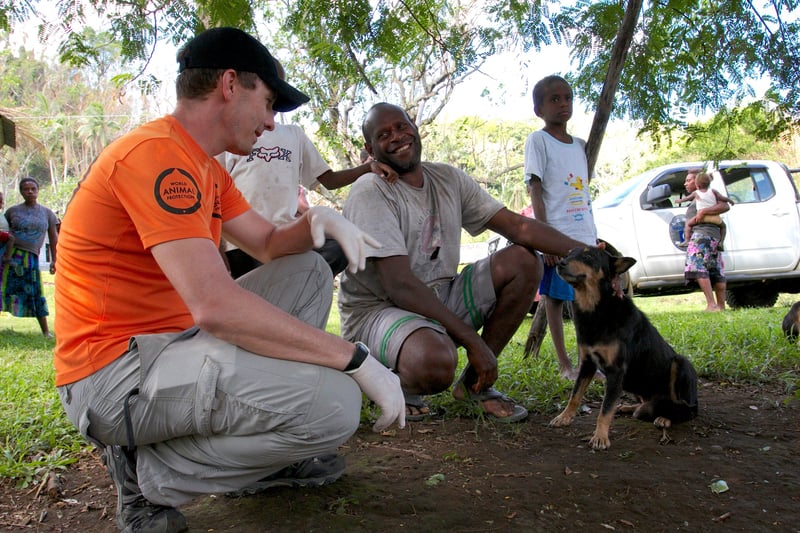
Cyclone Pam: Delivering lifesaving food and protection for up to 30,000 animals
News
After two weeks in Vanuatu, we have secured plans to protect up to 30,000 animals in the crucial next few months.
Two weeks on the ground
Our team has been working tirelessly to protect animals in Vanuatu for two weeks. We have been providing emergency treatment, whilst also assessing their longer term needs after Cyclone Pam devastated the island nation.
We have encountered cats, dogs and livestock in Vanuatu, where animals are an integral part of communities and their livelihoods. Working in close cooperation with the Vanuatu Government, we have been delivering aid where it is needed most.
Food shortages and community livelihoods
After completing our assessments, it is clear that the ever decreasing food supply is the most pressing issue for animals in Vanuatu. We have secured plans to provide food for up to 30,000 animals over the coming months, focussing on pigs and poultry. It has become clear to our response team that they are the most at risk group of animals on the islands.
Providing aid that will also ensure that communities have the best chance of a quick recovery is always central to our plans when responding to disasters. 80% of Vanuatu’s population are subsistence farmers and pigs and poultry are central to their livelihoods. By providing food for up to 30,000 animals over the coming months, our work will directly benefit nearly 2,000 households during this critical time.
Long term response and disaster risk reduction
Vanuatu is rated as the country most at risk of natural disasters in the world, as ranked by the World Risk Index. Reducing the risks disasters pose to the country is therefore central to Vanuatu’s security, for both animals and people.
Last year when Cyclone Lusi struck Vanuatu we were there to offer emergency aid. We also left a legacy in veterinary care for animals impacted by natural disasters in the country. This year when we returned, government vets responding to the devastation of Cyclone Pam carried our field kits with them, ensuring they had the equipment necessary to protect animals in an emergency.
When Cyclone Pam hit Vanuatu, the world’s disaster agencies and governments were in Sendai, Japan to negotiate a new global model to disaster risk reduction. We have been lobbying for progress for two years and we were there in Sendai to see animals supported by the UN for the first time in disasters.
Over one billion of the world’s poorest people rely on animals for food, transport and their livelihoods. For such vulnerable communities, addressing animal protection in the UN framework will help governments and communities include animals in disaster planning and preparation, reducing suffering and saving livelihoods.
We are now looking at putting in place long term plans to reduce the risk of disasters to animals in Vanuatu and we will continue to push for global progress in animal protection in disasters wherever they hit. With a comprehensive approach, we are aiming to protect millions of animals in disaster zones in the coming years.
We have only been able to carry out this work in Vanuatu with your help. Thank you to everyone who shared our stories and supported the response with a financial donation.
Whenever we respond to a natural disaster, where there is a need we work together with governments to reduce the risks of impacts on animals from future disasters. Read more about this work here, and follow us on Facebook and Twitter for all the latest news on our disaster responses around the world.
By providing food for up to 30,000 animals over the coming months, our work will also directly benefit nearly 2,000 households during this critical time